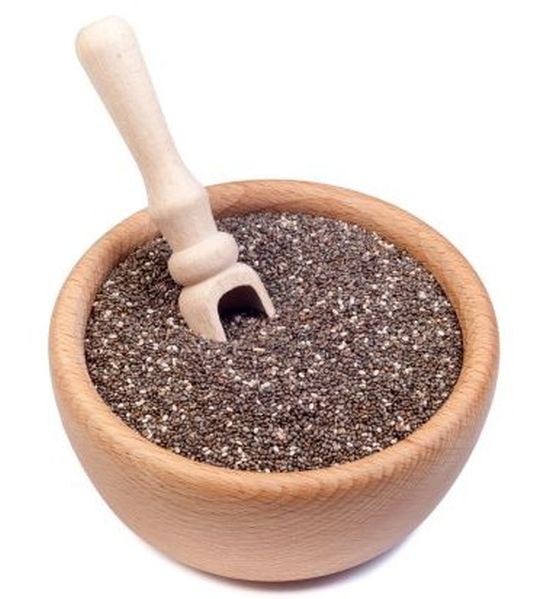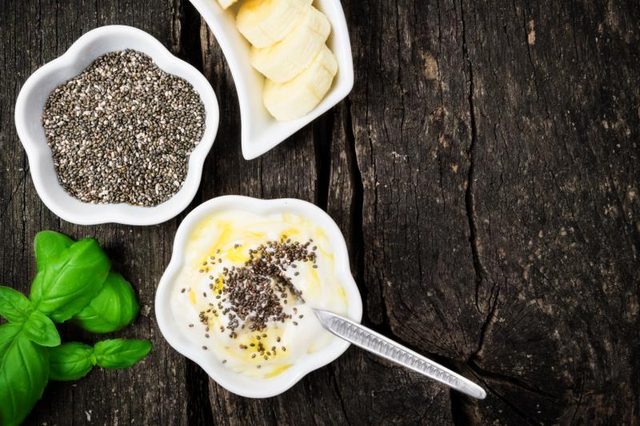Health Benefits of Chia Seeds

Chia seeds impart many health benefits, some of which include controlling diabetes, lowering cholesterol levels, improving the digestive system, boosting heart health, controlling hypertension, and they even contain anti-inflammatory properties.
Chia seeds come from the chia plant, which is native to Mexico and Guatemala. The scientific names of the plant are salvia hispanica and salvia columbariae. They both belong to the mint family (Lamiaceae). Chia seeds look similar to sesame seeds. They are very small and dark. This plant has been known to humans for a very long time. The chia plant had been cultivated by the Aztecs, Mayans, Incans and other tribes for a very long time. It was a staple food for them and historians considered it an important plant and food source for Native Americans. With the fall of the Aztecs and the general decline in the native population in the North American region, the use of chia seeds also declined.
By the end of the 19th century and the beginning of the 20th century, wheat and corn had replaced chia seeds as the crop of choice. This change in the staple food can be attributed to the travelers from Europe colonizing the New World and bringing forth their food grains like wheat, rice, corn, potatoes, and sweet potatoes.
Thus, the general preference of food changed over the years. As a result, the remaining Native Americans abandoned their ‘old food’ and took up ‘new food’. Chia seeds had been forgotten for a long time until recently. The beginning of the 20th century saw a revival of chia seeds as more and more people started knowing about chia seeds and their benefits.
Nutritional Value of Chia Seeds
According to the National Nutrition Database for Standard Reference, 100 grams of chia seeds contain 6 grams of moisture, 486 kcal of energy, 16 grams of protein, 30 grams of fat, 42 grams of carbohydrates, 34 grams of dietary fiber, 630 mg of calcium, 7 mg of iron, 335 mg of magnesium, 860 mg of phosphorus, 407 mg of potassium, 16 mg of sodium and 4 mg of zinc. Chia seeds also have vitamins such as vitamin C, thiamin,riboflavin, niacin, and vitamin E. Chia seeds also have no cholesterol!
Chia seeds are good sources of antioxidants as well. Chia seeds reportedly contain very high concentrationsof omega-3 fatty acids, which have many benefits in terms of healthy aging.. The antioxidants present in chia seeds include flavonol glycosides, chlorogenic acid, caffeic acid, kaempferol, quercetin, myricetin and linolenic acid. These antioxidants help in curbing the levels of free radicals in the body.
Health Benefits of Chia Seeds

Diabetes Control: The starches and carbohydrates present in chia seeds are released slowly in comparison to conventional diets and are therefore ideal fordiabetics as blood sugar level would not surge soon after having meals. A slower release of sugars into the blood stream can aid in optimum absorption of these sugars by each of the cells in the body. Hence, it is believed that the need for insulin diminishes.
Highest Supply of Omega-3 Fatty Acids:Chia seeds are a goodsource of omega-3 fatty acids, apart from certain types of fish. Omega-3 fatty acids are essential fatty acids required by the body and help to enable many bodily functions. They also help in controlling arthritis, osteoporosis, age-related dementia, and fatigue, among many other conditions.
High Supply of Calcium: The amount of calcium found in chia seeds is considered to be higher than what is found in skimmed milk. Therefore, having a handful of chia seeds daily is recommended to eliminate calcium deficiency. Calcium is needed for improved bodily functions and for bone and dental health as well, helping to reduce osteoporosis, joint weakness, and general body flexibility.
Improved Gastrointestinal Health: The high dietary fiber content of chia seeds is good for regulating bowel movements and also helps to keep up overall gastrointestinal health. Chia seeds make you feel full for longer, thereby reducing the urge to overeat.
Keeps Your Weight Under Control: Chia seeds have a high amount of dietary fiber, good protein content, moderate levels of carbohydrates, and omega-3 fatty acids. These nutrients, when combined, can play a significant role in keeping a person’s weight under control in the long run.
Heart-Friendly: Chia seeds are considered as heart-friendly food. The reason is that they are the richest source of omega-3 fatty acids in the vegetarian world. Omega-3 fatty acids are the good fats that protect the heart and prevent the onset of heart disease by reducing the levels of omega-6 fatty acids (bad cholesterol) and maintaining a stress-free cardiovascular system.
Lower Cholesterol Levels: Chia seeds are known to be a big source of alpha linolenic acid and omega-3 fatty acids. These fatty acids are indispensible for good health because they significantly reduce cholesterol levels.Studies show that chia seed consumption increased HDL cholesterol or good cholesterol levels but decreased the total cholesterol levels.
Controls Hypertension: The regular consumption of chia seeds is found to have a similar impact as regular medications for hypertension. The results of a study showed that chia seeds controlled systolic blood pressure by 6 ± 4 points. It also attenuates emerging and major cardiovascular risk factors in people with controlled type 2 diabetes.
Anti-inflammatory Properties: Chia seeds have high levels of alpha lenolenic acid, which can be easily converted into omega-3 fatty acids and act as an ideal inflammation controller. These fatty acids control inflammation in the joints and arteries. It is estimated that a daily intake of about 4 grams of alpha lenolenic acid is enough to prevent arthritis.





